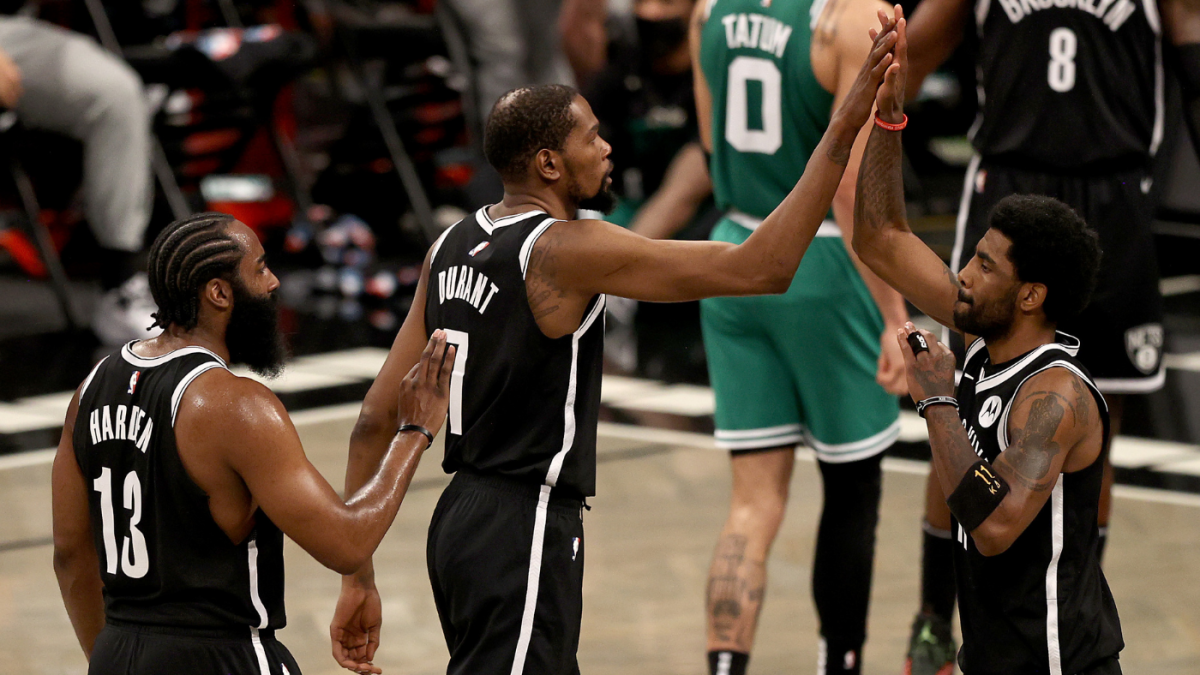
The Brooklyn Nets built a roster that they felt was ready to compete for an NBA championship once the playoffs tipped off. We still have a ways to go until a champion is determined but, from all indications, their opening night playoff game went according to plan.
Despite falling behind early on, thanks largely in part to struggling to make shots from the perimeter, the Nets and their starting lineup full of stars were able to take the lead early on in the second half and never looked back as Brooklyn ultimately cruised to a 104-93 victory in Game 1 of their best-of-seven series against the Boston Celtics.
Boston was hot from the perimeter to start the night, but as the game went on their shooting got cold and that allowed Brooklyn the opportunity to overcome their deficit and build a lead of their own. In the end, the Nets' trio of All-Stars combined for 82 points to give Brooklyn a 1-0 lead in their opening round series against Boston. Here are the three biggest takeaways from Brooklyn's win.
Please check the opt-in box to acknowledge that you would like to subscribe.
Thanks for signing up!
Keep an eye on your inbox.
Sorry!
There was an error processing your subscription.
1. Easy offense
The Nets didn't make their first 3-pointer until nearly the end of the first half. They scored only 16 points in the first quarter. All three of Brooklyn's stars got off to among their coldest starts of the season. Yet when the dust settled, they won this game by double digits. So what happened?
Well, aside from some improved overall shooting luck, Brooklyn's stars started doing what stars do on cold nights: they got to the foul line. Kevin Durant, James Harden and Kyrie Irving combined by 26 free-throw attempts in this game. That's what got them through their early offensive struggles. Brooklyn kept its offensive afloat at the foul line, and then, in the second half, their shots started falling enough for things to return roughly to normal.
This is part of what makes playing against Brooklyn so terrifying for defenses. There's just no easy solution. There's not one player to double or any schematic advantage a coach can draw up. Even when their shots all stop going in, their ball-handling and basketball IQ is so high that they can manufacture enough offense to keep games close until their shots start falling. Beating them means playing a basically perfect game. Boston didn't do that, but if they'd avoided the dumb fouls that plagued them in the second half, they might've been able to walk away with the victory.
2. Playoff problems
Playoff offense can be remarkably simple with the right matchups. If teams find a hole to pick at, they'll do it until the hole is filled. Boston found quite a bit of success going at Blake Griffin. On this play, for instance, Irving managed to push Jayson Tatum back to nearly half-court, but he uses it as an opportunity to call for a Tristan Thompson screen. That gets him the switch onto Griffin, who just can't beat him in a footrace to the basket.
When Kemba Walker draws him in this pick-and-roll, he manages to force Griffin into an overplay that results in an open jumper.
Unsurprisingly, after his first shift in the third quarter, Griffin didn't return to the game for the rest of the second half. Brooklyn was deep enough to make that adjustment. Boston was not. They had no choice but to continue using Jabari Parker for the sake of offense, and Brooklyn's stars went right at him. On this play, Irving comes to set a screen for Harden, but Harden waves him off. He already has the matchup that he wants on Parker, and he takes him to the rim.
The standard for defense in the postseason is significantly higher than it is in the regular season. If you give teams a weak link to attack, they're going to do it constantly. One of the important lessons from this game for Brooklyn is that Griffin's defense might be hard to protect against better teams. Boston, without Jaylen Brown, just doesn't have enough bodies left to protect Parker. He has to play, and that's going to make the Celtics that much easier to defeat.
3. Is crowd noise impacting shooting?
The average NBA game had 224.2 points this season. Sunday's first three games averaged just below 210, and that included an overtime matchup between the Heat and Bucks. All three home teams struggled significantly behind the arc. Milwaukee went 5-of-31 on 3-pointers, the Clippers shot 11-of-40 and the Nets went only 8-of-34 from downtown.
The sample here is tiny, and at this stage, there's no reason to read too much into this, but a possible explanation here might have to do with crowd noise. Take Brooklyn, for instance. The Nets hosted over 14,000 fans after New York dramatically relaxed restrictions in those areas. The Clippers only started allowing any fans into the Staples Center on April 18, but today, they had between 5,000-7,000 fans in the building.
This is a storyline to watch throughout the postseason as teams continue to increase capacity as vaccination numbers rise. Could the increased crowd noise have something to do with declining shooting numbers? It's a possibility. After all, teams shot nearly a full percentage point higher on 3-pointers this season (36.7 percent) compared to last season (35.8 percent). Something is behind that, and if numbers decline throughout the postseason as fans return to games, we might have our answer.
Article From & Read More ( Nets vs. Celtics Game 1 score, takeaways: Brooklyn star trio burns Boston in second half en route to 1-0 lead - CBSSports.com )https://ift.tt/3yybO20
Sports
Bagikan Berita Ini














0 Response to "Nets vs. Celtics Game 1 score, takeaways: Brooklyn star trio burns Boston in second half en route to 1-0 lead - CBSSports.com"
Post a Comment